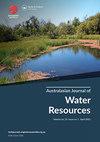Climate adaptation options for the 2026 MDB Plan: opportunities for managing climate risk
IF 2.2
Q2 WATER RESOURCES
引用次数: 4
Abstract
ABSTRACT How water resources are defined, both conceptually and legally, is central to their efficient and equitable allocation. With climate change introducing significant uncertainties to water resources management, flexible allocation frameworks are needed that can adapt to changing conditions. This paper explores options for climate-adaptive water allocation in Australia’s Murray Darling Basin. The 2026 revision of the Basin Plan may provide significant opportunities for proactive climate risk mitigation, but this depends on rigorous evaluation of policy options. The Water Act requires that the Plan’s revisions use the best available science to inform strategies that minimise the impact of climate risks. The Act also enables the use of ratios and formulas as alternatives to using long-term averages as the basis of the Plan. However, there have been limited investigations into using these alternatives. Achieving more adaptive policies depends on rigorously assessing climate risk management options. Given the far-reaching consequences of climate change, rigorous investigations are needed into reforms to the established approaches to water resources planning and to existing water entitlements and allocation regimes. At minimum, this means reassessing the total resource pool and all subsidiary targets and investigating allocation frameworks that equitably share risks between extractive users and the environment.2026年多边发展银行计划的气候适应选择:管理气候风险的机会
本文章由计算机程序翻译,如有差异,请以英文原文为准。
求助全文
约1分钟内获得全文
求助全文
来源期刊

Australasian Journal of Water Resources
WATER RESOURCES-
CiteScore
5.10
自引率
21.90%
发文量
25
期刊介绍:
The Australasian Journal of Water Resources ( AJWR) is a multi-disciplinary regional journal dedicated to scholarship, professional practice and discussion on water resources planning, management and policy. Its primary geographic focus is on Australia, New Zealand and the Pacific Islands. Papers from outside this region will also be welcomed if they contribute to an understanding of water resources issues in the region. Such contributions could be due to innovations applicable to the Australasian water community, or where clear linkages between studies in other parts of the world are linked to important issues or water planning, management, development and policy challenges in Australasia. These could include papers on global issues where Australasian impacts are clearly identified.
 求助内容:
求助内容: 应助结果提醒方式:
应助结果提醒方式:


